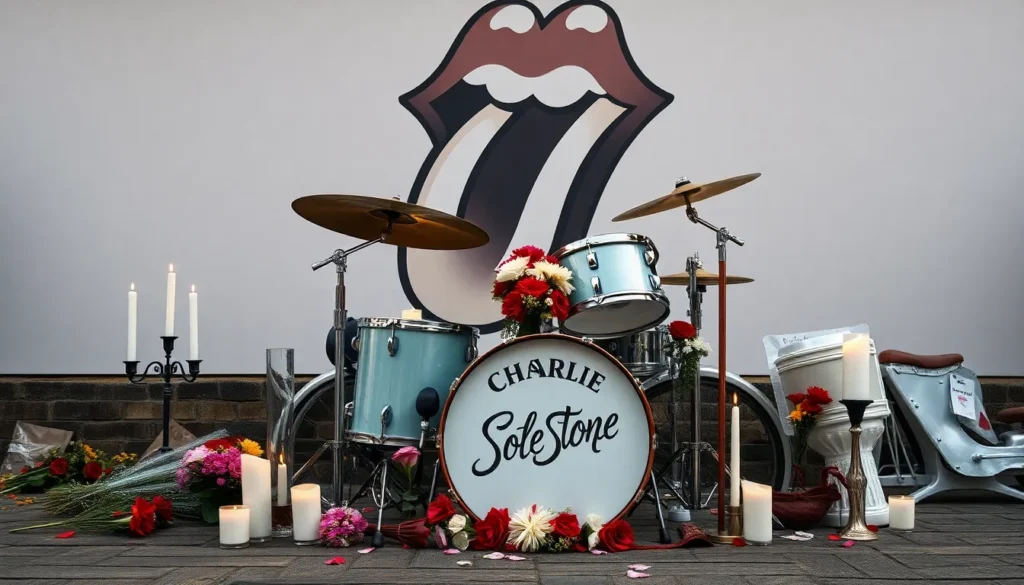Table of Contents
ToggleWhen the world learned of Charlie Watts’ passing, it felt like the universe lost its steady heartbeat. The legendary drummer of The Rolling Stones wasn’t just a musical icon; he was the backbone of rock ‘n’ roll, keeping the rhythm alive for decades. Fans everywhere wondered what could possibly take such a stalwart figure from the stage.
As the dust settled, questions arose about the cause of his death. Was it a wild rock star mishap or something more mundane? While the details may not be as scandalous as a backstage brawl, they reveal a deeper story about health and the inevitable passage of time. Dive in as we explore the circumstances surrounding his passing, shedding light on the man behind the drums and the legacy he left behind.
Overview of Charlie Watts
Charlie Watts served as the drummer for The Rolling Stones for over 50 years. Known for his calm demeanor and impeccable rhythm, he contributed significantly to the band’s distinct sound. Born on June 2, 1941, in London, England, he began playing drums at the age of 13. His early influences included jazz musicians, which shaped his unique approach to rock music.
Watts joined The Rolling Stones in 1963, quickly becoming an integral member. His steady beat often balanced the band’s dynamic performances, earning him respect from peers and fans alike. Notably, he maintained a low-profile public image, a rarity in the spotlight of rock stardom. Personal life included a long marriage to Shirley Ann Shepherd, with whom he had one daughter and one son.
Throughout his career, Watts received numerous accolades, solidifying his status as one of the greatest drummers in rock history. His contributions extended beyond drumming; he designed album covers and collaborated on various jazz projects. Celebrated for his modesty, Watts frequently expressed gratitude for his career and the opportunities it provided.
On August 24, 2021, the music world mourned his passing at the age of 80. Fans and colleagues alike remembered him not just as a musician but as a beloved friend. Conversations around his death often emphasize the humble nature he embodied throughout his life.
Life and Career of Charlie Watts

Charlie Watts remained a pivotal figure in rock music for decades. His influence extended beyond his role in The Rolling Stones, shaping the sound of an entire generation.
Early Life
Born on June 2, 1941, in London, Charlie developed an early passion for music. At the age of 13, he picked up the drumsticks and immersed himself in jazz. Inspired by renowned jazz musicians, he honed his skills and nurtured a deep love for rhythm. Education at Tulse Hill School exposed him to diverse musical styles, enriching his understanding of drumming. Family support played a crucial role in his artistic development, encouraging his creative pursuits from a young age.
Musical Journey
Charlie joined The Rolling Stones in 1963, marking a significant turning point in his career. His distinctive drumming coupled with a steady, unwavering beat became the band’s signature sound. Contributions to iconic tracks like “Paint It Black” and “Gimme Shelter” showcased his talent and versatility. Beyond classic rock, Watts explored jazz, collaborating with various artists and bands. His passion for creativity led to designing album covers and participating in various artistic ventures. Recognition from peers and credible institutions solidified his status as one of rock’s greatest drummers.
Circumstances of Death
Charlie Watts passed away on August 24, 2021. His death marked a significant loss for the music community, particularly among fans of The Rolling Stones.
Date and Location
Watts died in London, where he had lived for most of his life. This city served as the backdrop for his storied career. News of his passing emerged in the early morning hours, sending shockwaves through the global music scene. Family and friends surrounded him at the time, providing comfort during his last moments.
Immediate Causes
The specific immediate cause of Charlie Watts’ death remains unreported publicly. Reports suggest he had faced health challenges in recent years, notably undergoing a successful heart procedure shortly before his passing. Such medical issues often prompt discussions on heart health, especially for aging musicians. Reactions to his death emphasized the significance of such health matters, reminding the public of their importance. Despite speculations, the focus remains on his legacy rather than the circumstances leading to his death.
Speculations and Theories
Charlie Watts’ unexpected passing sparked numerous discussions regarding potential contributing factors. Many fans and observers seek to understand his health and lifestyle choices leading up to his death.
Health Issues
Watts had a history of health concerns that might have influenced his passing. In June 2021, he underwent a successful heart procedure, which raised alarms among fans regarding his overall well-being. Reports indicate he faced several other health challenges in the preceding years, including issues related to his heart and a hospitalization linked to an unspecified illness. The urgency of these matters led to speculation about their impact on his longevity. Observers continue to emphasize the importance of heart health, particularly among aging musicians.
Lifestyle Factors
Watts maintained a relatively modest lifestyle compared to many rock stars. While his career in music spanned decades, he didn’t engage in the typical excesses associated with the industry. Instead, he focused on family, respecting both his marriage and responsibilities as a father. His decision to prioritize health over frenzied social life set him apart. This dedication to a simpler lifestyle may have contributed to his enduring success but also led to discussions about stressors associated with fame. Despite his reclusive nature, the pressures of touring and performing may still pose risks to health.
Reactions and Tributes
Tributes poured in following Charlie Watts’ passing, illustrating the profound impact he had on the music community. Friends, fellow musicians, and fans expressed their grief and respect for the legendary drummer.
Industry Response
Recognized figures in the music industry shared heartfelt messages after Watts’ death. Mick Jagger honored him, recalling their long friendship and collaborative spirit. Keith Richards emphasized the importance of Watts’ steady presence, describing him as the band’s foundation. Numerous artists, including Ringo Starr and Paul McCartney, acknowledged Watts’ unmatched contribution to rock music. The loss resonated far beyond The Rolling Stones, with many noting how his style influenced generations of drummers and musicians alike. Fellow drummers cited him as a guiding force, inspiring countless performances and recordings throughout the decades.
Fan Reactions
Fans took to social media to share memories and express their sadness. Across platforms, countless fans posted tributes, highlighting favorite songs and concerts that featured Watts. Many recalled how his drumming added depth and richness to iconic tracks like “Jumpin’ Jack Flash” and “Start Me Up.” Emotional messages reflected a profound sense of loss, revealing how Watts’ talent resonated deeply with fans’ lives. Memorials, both virtual and physical, emerged in various locations symbolizing the love and respect fans had for him. The outpouring of grief showcased the special connection Watts built through his music, leaving an everlasting imprint on fans worldwide.
Charlie Watts’ passing leaves a significant void in the music world. His legacy as the steadfast drummer of The Rolling Stones continues to resonate with fans and musicians alike. The impact he had on rock music is undeniable, shaping the sound of an entire generation.
While the specifics of his health challenges remain private, the focus shifts to celebrating his remarkable career and the joy he brought to countless listeners. Watts’ modesty and dedication to his craft serve as an inspiration for aspiring musicians everywhere. His contributions will forever be cherished, ensuring that his spirit lives on through the music he helped create.




